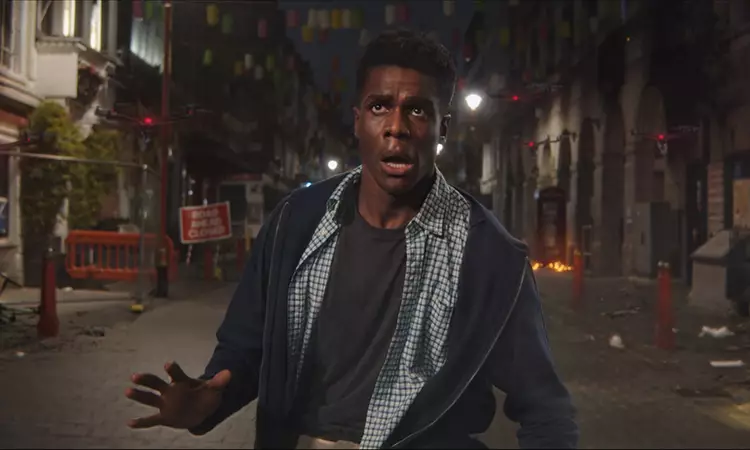The inquiry into whether humanity stands alone in the cosmos has tantalized and terrified us for centuries. Josephine Rose’s feature debut, “Touchdown,” begins with a provocative quote from Arthur C. Clarke—”Two possibilities exist: either we are alone in the universe or we are not. Both are equally terrifying.” Set in the near future, the film ignites an emotional and intellectual exploration of First Contact, echoing the profound existential threads woven through classics like Stanley Kubrick’s “2001: A Space Odyssey.” However, “Touchdown” distinguishes itself by situating its narrative on the ground, offering a unique lens into how humanity grapples with the unknown and the inherently flawed systems of communication that define our connections.
The film unfolds on September 28, 2024, after a cataclysmic shower of meteors has plunged Earth into a state of emergency. Following a multi-city vlogger, Jamie, and his friends, the narrative explores their attempts to survive under circumstances of lockdown and martial law. Encounters with mysterious alien entities manifest not through grandiose cinematic spectacles, but through the lens of everyday life, emphasizing a human story amid the chaos. Unlike traditional alien invasion tales that often glamorize heroic bravado, Jamie and his friends grapple with the immediacy of fear, uncertainty, and the necessity of digital communication, highlighting the fractures and resilience of human relationships in times of crisis.
A central theme of “Touchdown” is the precarious nature of human connection in an increasingly isolating environment. Jamie and his friends—spread across various cities and faced with stringent lockdown measures—must rely on digital platforms to maintain their bonds. This reflects a contemporary reality that many viewers would resonate with, emphasizing how technology can both bridge and distance us. The film reveals a paradox: while social media affords instantaneous connection, it also fosters disinformation and confusion during moments of global significance.
As martial law ratchets up tension and the government resort to media cover-ups, Jamie’s struggle to source genuine information amid the noise becomes indicative of broader societal dialogues about trust and truth. The film sharply critiques governments that obfuscate the situation while promoting fear through catchy soundbites from officials, effectively painting those in power as potentially more dangerous than the elusive alien species.
The extraterrestrial presence in “Touchdown” serves not only as a narrative driver but also as a symbol of humanity’s deepest fears and insecurities. The aliens’ ambiguous intentions and existence act as a mirror to the inconsistencies within our terrestrial institutions. As the film progresses, Jamie begins to question whether the real threat lies beyond Earth. This self-reflective inquiry emerges against a backdrop of increasingly palpable paranoia driven by both governmental narratives and sensationalized media channels.
By juxtaposing the encounters with these feared “vermin”-like creatures against the backdrop of Jamie’s and his friends’ attempts to maintain normalcy through online communication, the film deftly underscores the inherent complexities tied to first contact. The enthralling and menacing atmosphere highlights the tension between wonder and dread, encompassing the nuances of human emotion in the face of the unknown.
“Touchdown” invites viewers to engage with pressing philosophical questions about existence and connection in times of crisis. Through a grounded narrative, it emphasizes the challenges posed by isolation and misinformation in a digitally connected world. The story of Jamie and his friends embodies both the fragility and resilience of human relationships, posing a poignant reminder that even in the face of extraterrestrial uncertainties, it is our connections—and the truths they yield—that define our humanity. In doing so, the film not only recycles the well-trodden trope of alien invasion but revitalizes it with a contemporary lens, ultimately offering a mirror through which we may examine our society’s responses to the bizarre and the unforeseen.

